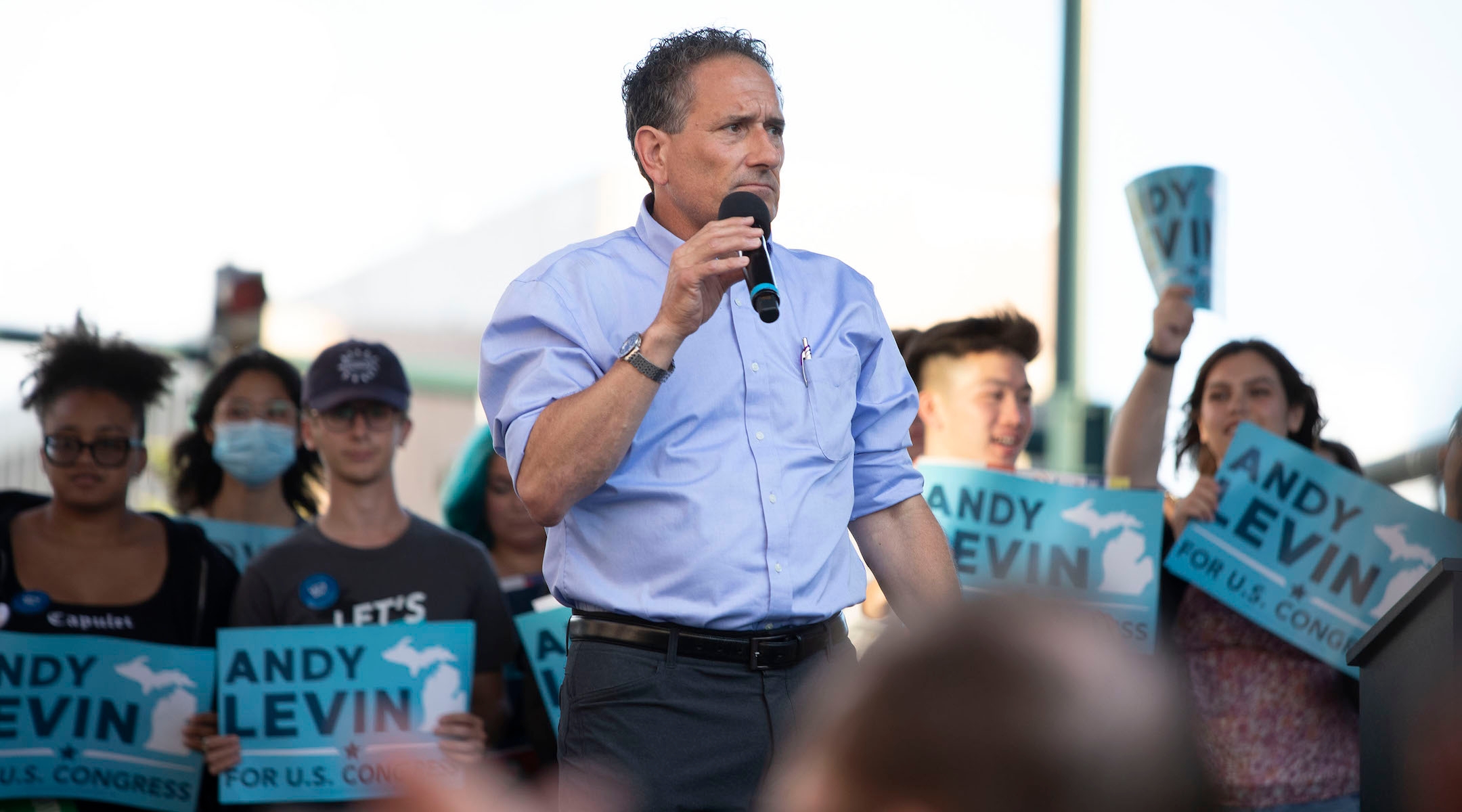People cast their ballots at the Foreign Language Immersion and Cultural Studies elementary school on November 08, 2022 in Detroit, Michigan. (Brandon Bell/Getty Images)
(JTA) – About two dozen progressive Jewish activists tuned into the “MI Jews Uncommitted Phone Bank” this week, ready to ask their networks not to vote for President Joe Biden.
Their virtual phone bank, held ahead of Michigan’s Feb. 27 primary, was unlike any other. Instead of a get-out-the-vote campaign, this crew would be better described as don’t-get-out-the-vote.
Upset with Biden’s stalwart support for Israel in its war with Hamas in the Gaza Strip, and with the tens of thousands of Palestinian casualties, most of them civilians, these Jews want to use their moment at the ballot box to force the president to change course.
The campaign subscribes to the view that Israel’s actions constitute genocide, a charge common among pro-Palestinian activists that Israel and the United States strenuously deny. Israel says it is not intentionally targeting civilians and blames Hamas for embedding among and beneath them.
“As Michigan Jews, we are important messengers in a multiracial and multi-faith, anti-war coalition telling President Biden that we are uncommitted to his administration’s funding of genocidal war in Gaza,” a mission statement reads.
The Jews backing the Uncommitted campaign — which is also called Listen to Michigan — are part of a fast-growing movement, initiated by local Arab American activists, that hopes to send a message to the White House about its Israel policy. And they think the swing state’s new early primary slot gives them a perfect chance to do so.
“I think that there is an assumption from the Biden administration, as well as many others in power, that they can count on Jewish support and the Jewish vote as things carry on in this way in Gaza,” Eleanor Gamalski, a local Jewish organizer who headed up the phone bank, told the Jewish Telegraphic Agency. “Many Jews that I know would object to that.”
Gamalski is the deputy director of Detroit Jews for Justice, a social justice nonprofit, and a onetime staffer for Andy Levin, the Jewish former Democratic congressman and member of a Michigan political dynasty. But her participation in the Uncommitted campaign is on her own behalf. She’s a longtime friend of Abbas Alawieh, a Lebanese American Democratic strategist who helped launch the campaign alongside Layla Elabed, sister of Detroit Rep. Rashida Tlaib, who is Palestinian-American and the House’s most vocal Israel critic.
To Gamalski, the movement seemed like a perfect opportunity to push for policies her progressive Jewish network wants: namely, a ceasefire in Gaza, an exchange of Israeli hostages and Palestinian security prisoners, and a commitment “to stop sending U.S. weapons and dollars to fund this genocide.”
Michigan is one of a handful of key swing states that helped determine the last two presidential elections, in one case by a razor-thin margin: Donald Trump won the state in 2016 by only about 10,000 votes. The Uncommitted campaign hopes to demonstrate it has at least that number of supporters, a large enough bloc to potentially swing the state and force Biden’s attention.
Campaign organizers declined to tell JTA how many people had signed its pledge. But Arab and Muslim Americans have been warning for months that their communities could withhold their votes from Biden over Gaza. With an estimated more than 300,000 Arab Americans in the state along with assorted allies, the 10,000 mark seems plausible to reach. (Getting to Biden’s margin of victory in 2020, more than 150,000, would be more difficult.)

Former Michigan Democratic Rep. Andy Levin holds a campaign rally on July 29, 2022 in Pontiac, Michigan. (Bill Pugliano/Getty Images)
At least some Jewish voters will be part of the count — including, possibly, Levin himself. He told JTA he’s backing the Uncommitted campaign precisely because he wants to ensure Biden takes Michigan in November. He doesn’t think the president’s current course on Israel will cut it: not just for Arab and Muslim Americans, but also for other constituencies like Black churches, which have become increasingly vocal in their calls for a ceasefire.
“I’m betting on Joe Biden to find a way to become a peacemaker in Israel and Palestine, so that people can vote for him later,” Levin said. “I feel like this is existential for Joe Biden’s political survival. I don’t see how he wins reelection without winning Michigan, and I don’t see how he wins Michigan without changing course.”
Levin isn’t the only big progressive voice supporting the campaign. Our Revolution, an activist group founded by progressive Jewish Sen. Bernie Sanders in 2016 and currently chaired by Jewish labor activist Larry Cohen, also announced this week that it would encourage its 87,000 Michigan followers to vote Uncommitted to “push Biden to change course on Gaza now.”
Michigan is also home to a Jewish community of around 100,000and its big Jewish institutions and personalities — including Temple Israel, the nation’s largest Reform congregation, as well as a politically connected yeshiva and a former president of AIPAC — remain staunchly pro-Israel. A poll from November showed that most American Jews back Biden’s approach to the conflictand previous polls have shown that most U.S. Jews have an affinity for Israel.
The Detroit JCRC/AJC, the local federation’s community relations arm, told JTA it would not be issuing any public comment on the Uncommitted campaign. And the campaign is new enough that some major figures in the state’s Jewish community told JTA they had not heard a lot about it — though they were not happy about what they learned.
“Any effort that takes votes away from Joe Biden will only benefit Donald Trump, and job one is to make sure he doesn’t become president,” Mark Jacobs, a local liberal AIPAC supporter who also co-founded the Detroit Coalition for Black and Jewish Unitytold JTA. Jacobs — who has done significant outreach to Detroit-area Black churches since the outbreak of war on Oct. 7 and is preparing to launch a leadership academy this month for Black and Jewish teenagers — didn’t know about the Uncommitted campaign; he said he wasn’t speaking on behalf of the coalition or AIPAC.
When he found out about the campaign, Jacobs said he didn’t think a successful Uncommitted initiative would change many Jewish votes in Michigan, even if Biden took a more aggressive posture toward Israel as a result of the pressure.
“Arguably, there may be a sliver of Jewish voters who are a bit on the fence about Biden and maybe if he becomes more vocal during the political season, saying things that are not embraced by many members of the Jewish community, then that could have an impact to some extent,” he said. “But I’m just so fixated on the god-awful harm that would be caused by a Trump presidency.”
Few are as familiar with navigating intra-Jewish politics in the state as Levin himself, who lost a primary race for his redrawn House seat in 2022 after pro-Israel groups unhappy with his policies spent more than $4 million to back his non-Jewish opponent over him. Still, Levin insisted, Biden “doesn’t have to worry about the Jewish vote, I don’t think.”
In an acknowledgement of the growing pressure on him regarding Israel, Biden’s team met recently with Arab leaders in the state to apologize for “missteps” in his handling of the warincluding not more forcefully advocating for Palestinian lives. Alawieh said he interpreted this as referring to the president’s public statements, not his actual Israel policies.
“Senior Biden officials were talking about the mistakes as more of a messaging problem,” Alawieh told reporters during a Listen to Michigan press briefing last week. “But what was absent from what they were saying was any commitment to push even privately for a ceasefire that saves lives.”

Pro-Palestinian Jews attend a campaign featuring Senator Bernie Sanders (I-VT) and Michigan Democratic Reps. Andy Levin and Rashida Tlaib on July 29, 2022 in Pontiac, Michigan. (Bill Pugliano/Getty Images)
Asked by JTA what it would take for him to come back around on Biden before November, Alawieh said he wanted to see the president “apply the most basic levels of accountability to condition military funding” to Israel. Elabed said she would need to see “a permanent ceasefire” before she would even consider voting for Biden.
Many in Michigan and beyond aren’t thrilled with the campaign’s goals. “This is how Trump becomes president again,” reads a typical comment on the Listen to Michigan Instagram, a concern also echoed by Michigan’s popular Democratic governor, Gretchen Whitmer.
“A potential second term for the former president would be very hard on all the communities that are still being impacted by what’s happening overseas as well, and that’s something that shouldn’t be lost on people’s calculation, too,” Whitmer told reporters Thursday.
Gamalski rejects that argument. “I think the Biden administration, if they are to lose to Trump in November, it’s because of the choices that they have made and the courage they failed to exhibit in standing up to the weapons industry and in calling for a stop to this war,” she said.
Organizers insist the campaign only applies to the primary (in contrast to another local campaign, Abandon Bidenencouraging Michigan voters to stay home altogether in November). Yet many members are noncommittal about how they’ll vote in the general. One of Listen to Michigan’s Instagram posts suggests the campaign could hurt Biden more than just symbolically.
“Uncommitted is the best strategy because it not only takes votes away from Biden but removes delegates from him if we can get to a 15% threshold,” the post reads. “If Biden doesn’t get enough delegates nationally he doesn’t get the nomination.”
And then there’s the fact that some of the loudest voices pushing for an Uncommitted vote have also praised Hamas or downplayed the extent of the atrocities it committed on Oct. 7. Osama Siblani, publisher of the Arab American News, headquartered in Dearborn, said at an October rally, “We are not going to be intimidated by staying silent when they say Hamas is a terrorist organization.” He was in the meeting with Biden officials and has endorsed the Uncommitted campaignsaying, “Vote for anyone you want to vote for, but don’t vote for Biden because he is complacent in the crime against Palestinians.”
The Jews backing the campaign acknowledge the presence of views like Silbani’s but say it doesn’t change their support. Levin said it’s “all the more reason to get in there and hold up a banner of integrity and of sanity,” to prove that not everyone backing a ceasefire is a Hamas supporter.
Gamalski chooses to focus on the ways in which she does feel kinship with the campaign’s organizers.
“It’s really evident to me that the folks organizing this are concerned about bringing about a better future for everyone, including Jews,” she said. “I know that folks in this coalition have shown up for me and spoken out against antisemitism, and they don’t compartmentalize their work on any one oppression. And so I knew right away that I was in good company.”
This article originally appeared on JTA.org.








